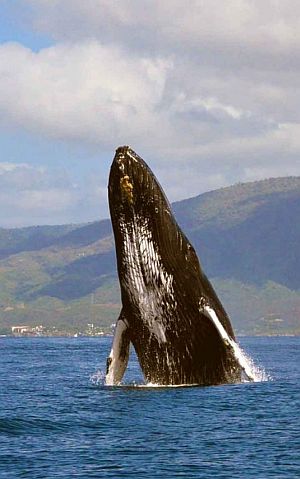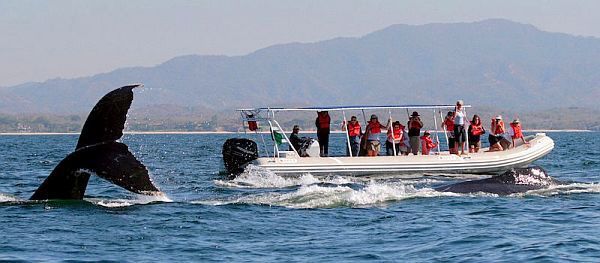Puerto Vallarta, Mexico - There are many ecological tours and exciting activities to enjoy in Vallarta-Nayarit, but nothing compares to the thrill of whale watching on Banderas Bay.
Each year in late November, hundreds of Humpback whales start arriving off the coast of Puerto Vallarta and the Riviera Nayarit. Their annual migration from the cold waters of Alaska brings them as far down as the Bay of Banderas where they will procreate and raise their young in our warm waters, which offer some of the most spectacular whale watching opportunities in the world.
This year, December 1st is the first official day of the 2016-2017 whale watching season in the Bay of Banderas, according to Roberto Rodríguez Medrano, the Nayarit delegate of SEMARNAT, Mexico's Ministry of Environment and Natural Resources.
In an interview with nnc.mx reporter, Oscar Gil, the federal official in Nayarit reported that SEMARNAT will be issuing approximately 236 permits to Banderas Bay whale watching tour operators for the 2016-2017 season, which runs from December 1 through March 23.
To be authorized for whale watching, all tour providers must obtain the appropriate authorization from SEMARNAT, pursuant to Wildlife Act provisions and regulations.
"To be SEMARNAT authorized for this activity, whether the tour provider is a single vessel, a cooperative, or a company that requests several permits for several boats, every captain and crew member must take a preparation course every year," Rodríguez Medrano told nnc.mx.
 |
These safety measures ensure the protection and conservation of the Humpback whales in their natural habitat, and offers whale watchers the best possible experience.
According to the SEMARNAT-established guidelines, at the beginning of each trip, the tour service provider must inform participants about the legal procedures for whale watching activities, which are as follows:
• In the presence of whales, the speed limit and navigation within the area of observation must be less than 5 knots (9 km/h), and speed must be reduced to 2 knots (4 km/h) upon entering the observation area.
• Only 4 boats at a time can closely observe the same whale or group of whales.
• In areas authorized for observation, authorized vessels can remain in the vicinity of the whale or pod for a period of no longer than 30 minutes.
• The minimum distance between any vessel and the whale or pod of whales is established according to vessel size and the species under observation.
Tips for Responsible Whale Watching
• When you are offered a Puerto Vallarta whale watching trip, make sure the boat has the proper permit. Each authorized vessel is required to have a copy of their permit onboard and raise the whale watching flag.
• If you are sold a whale watching trip and the boat does not have a permit or flag, return to the person who sold you the tour, demand a complete refund, and report the infraction to the proper local authorities.
• Scuba diving or snorkeling in the vicinity of a whale is very dangerous and is forbidden by law. Jet skis, water skis, kayaks, canoes, etc. are also forbidden in the vicinity of whales.
• Trash, especially plastic bags and such can suffocate a whale if it is sucked into this blow hole. If you see plastic bags floating in the water please take the time to retrieve them. This small action may in fact safe the life of an endangered whale.
Following these few simple steps will ensure a safe whale watching experience for you and your friends and, more importantly, help protect these gentle giants that call Banderas Bay their home for a few months every year.



